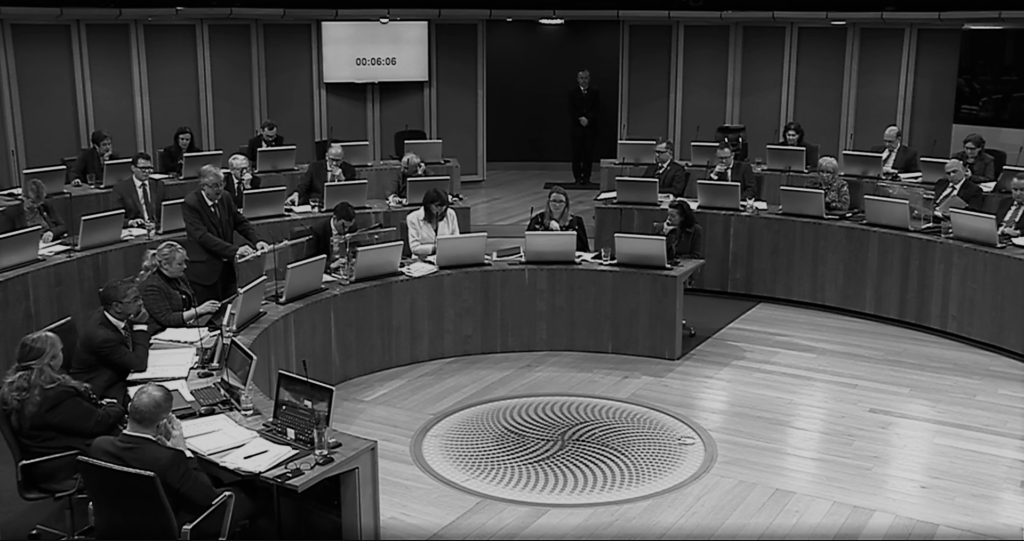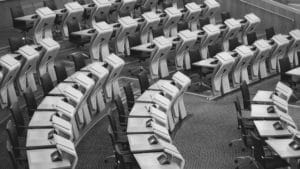Yesterday, ministers lined up in the Senedd to discuss the implications no deal would have on their portfolios, with the resounding message being that Wales would be much worse off if the UK leaves the EU without securing a withdrawal agreement.
First Minister
The First Minister, Mark Drakeford, made the opening statement, calling on the UK Government to take the possibility of a no-deal Brexit off the table. He said if MPs cannot agree on a deal, a second referendum would be preferable to no deal at all but insisted it is still possible for Parliament to reach an agreement that protects the Welsh economy and respects the referendum result.
Professor Drakeford discussed the Welsh Government’s preparations for no deal, such as funding from the £50m EU transition fund. He said a citizens’ assembly could be one solution to breaking the Brexit deadlock after Plaid Cymru leader Adam Price made the case for one.
Health and Care
Vaughan Gething, the Health and Social Services Minister, told AMs that the Welsh Government is reliant on the UK Government to ensure medicine supplies are available if no deal is reached. He called for certainty on the availability of medical devices and outlined concerns over the supply of isotopes if the UK is no longer a member of Euratom.
Mr Gething said changes in migration policy would impact the domiciliary, social and children’s care sectors the most, cautiously welcoming the decision to scrap the £65 fee that EU citizens would have had to pay to apply for settled status in the UK.
Transport
Ken Skates, the Economy and Transport Minister, said a no-deal Brexit could cause severe disruption to the transport network. He said ferry ports would be particularly vulnerable to longer waiting times at borders due to customs checks.
He also discussed issues around freight haulage, suggesting that the European Commission’s proposed temporary solution would merely be a “stay of execution” until the end of 2019. He then highlighted possible problems using driving licences and travelling by plane if no deal is reached.
Rural Affairs
Minister for Environment, Energy and Rural Affairs, Lesley Griffiths, said tariffs are likely to be applied to imports and exports if no deal is reached, resulting in higher prices, more bureaucracy and longer delivery times. She said the consumer would face higher prices and food could attract tariffs in excess of 50%.
The Minister said businesses would have to handle previously unnecessary red tape such as customs declarations, adding that border checks would cause delays and food spoilage. She also outlined concerns about the veterinary workforce, noting that almost all government vets working in Welsh abattoirs are from EU countries.
Public Services
Julie James, the Housing and Local Government Minister, told the Assembly that the Welsh Government is working with a range of partnerships to put civil contingencies in place. She said this included ensuring food security and medicine supplies.
Ms James assured AMs that public services are preparing for a no deal, explaining that the government would manage its no-deal response through its emergency co-ordination centre. She discussed work to protect EU citizens living in Wales from hate crime and funding for councils to prepare for no deal.
Brexit Minister
Jeremy Miles, the Counsel General and Brexit Minister, finished the day’s proceedings by outlining the impacts of a no-deal Brexit on the Welsh economy. He said there would be “profoundly negative” consequences for workers and businesses and suggested incomes could be up to £2,000 lower, discussing the impact on living standards.
Mr Miles warned of a loss of access to funding, collaboration and international talent in the field of research which could damage Welsh universities and colleges and “stifle” innovation.
What did the opposition say?
Some Brexit-supporting AMs criticised the Welsh Government for its lack of optimism about the opportunities a no-deal Brexit would present, with Welsh Conservative spokesperson Darren Millar accusing the government of peddling “Project Fear on steroids”.
Politicians from across the Siambr suggested the government has failed to engage with a range of sectors on no-deal planning and had left it too late to adequately prepare.
You can keep up to date with everything happening in the National Assembly for Wales by subscribing to Newsdirect’s free daily political briefing from Wales.



